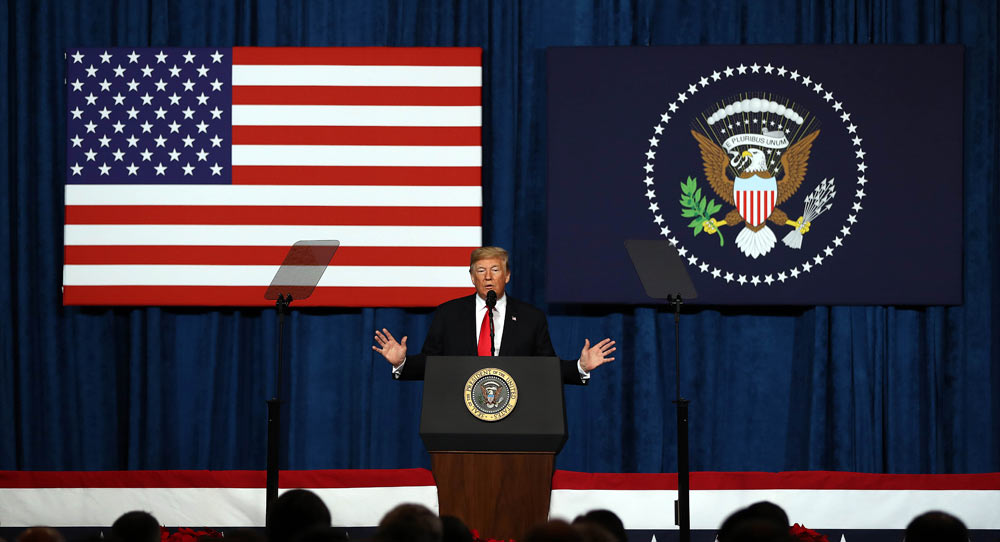Europe this year will be in a state of distraction.
Whether it’s Brexit, the European Parliament elections, who will take over the leadership of the EU’s institutions, or which political parties will come out top in regional elections in Germany, they are all distractions.
They are distractions because they ignore the bigger, more important picture that is unfolding between Europe and the United States. The post-1945 transatlantic relationship is coming to an end.
President Donald Trump, whom most European leaders bash, mock, and patronize as if he was responsible for Europe’s woes and weaknesses, has thrown down the gauntlet to America’s allies. But they are unwilling to respond because it would mean accepting the reality and responsibility.
The reality is that the security guarantees that the United States extended to Europe, and in turn shaped the way the post-1945 era made Europe dependent on America’s protection, are ending.
This security umbrella went hand-in-hand with American financial, political, and economic support for putting Western Europe back on its feet after the appalling devastation wrought by Nazi Germany. Yes, it was in America’s interest to have a bulwark in Western Europe against the communist East and the Soviet Union. It was also in America’s interests to have a part of the continent end centuries of fighting and live in peace.
In short, the United States was crucial for building what is today’s European Union. Security, peace, and prosperity of Europe would not have happened without Washington’s unflinching support. Following the collapse of the Berlin Wall in November 1989, a Europe whole, united, and free became the mantra of successive U.S. administrations.
Yet that goal is now being challenged by Brexit as well as by several populist movements across Europe. They have the potential not only to weaken Europe, but without strategic foresight and strong EU leadership, they could lead to the gradual disintegration of Europe, which would further erode the transatlantic relationship and weaken the West.
The fact that Brexit and populist movements can wreak such damage shows how European leaders have failed to prepare for a post-transatlantic era. They took American leadership and its security guarantees for granted. They assumed that the post-1945 architecture of multilateral institutions, values, and democracy were permanent.
Trump’s policies, however much they are loathed by Europeans, have shown that the EU as a whole has put forward no strategic policies or come up with options to counter Trump’s claims that the Europeans are free riders. If they did, then this side of the Atlantic would have taken its defense, security, and foreign policy seriously.
As it stands, the record on defense and foreign policy is miserable. The European members of NATO like to convince themselves that spending more on defense will in turn convince Trump that America’s allies are pulling their weight. That won’t suffice.
Leaving aside the fact that there is still far too much duplication of military equipment and too little interoperability, the Europeans as a whole do not do collective defense. They do not do hard power. The EU members cannot even put together a security force to protect the bloc’s external borders, which is essential for making the Schengen system sustainable.
Further afield, when Trump announced that he was going to withdraw U.S troops from Syria, the Europeans complained loudly. They rightly claimed that the Kurdish forces in Syria, which the United States had supported, would be left to the mercy of Turkey, not to mention the fact that Syria’s future would rest with Moscow, Ankara, and Iran—the three main players in this part of the Middle East.
Yet where was Europe during the entire Syrian war? If Europe believes so much in the role of diplomacy and soft power (which does require hard power to give both any substance), it wasn’t evident in Syria or for that matter in the rest of the Middle East.
And while the EU praised itself for getting Tehran to sign on to a deal that would contain its ambitions to develop nuclear weapons, it wielded no influence over Iran’s blatant ambitions in Syria or its threats against Israel. And just as the Europeans have criticized Trump’s pro-Israel stance, they have had no impact whatsoever in reviving what’s left of the peace process or for that matter the two-state solution.
In essence, however much the Europeans dislike Trump’s foreign policies, they have put no options on the table. This is their real weakness when it comes to dealing with Washington. So while the EU looks increasingly inward, member states seem unwilling to intellectually together grasp how Brexit and Trump are symptoms of the end of the post-1945 era. If Trump is challenging the Europeans to act, that’s not going to happen during 2019.










